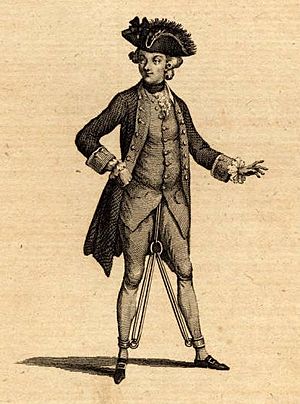Margaret Kennedy (singer) facts for kids
Margaret Kennedy (born Margaret Doyle; died January 23, 1793) was a talented singer with a deep voice (a contralto) and an actress. She was famous for playing male characters on stage, especially in the operas created by Thomas Arne.
Contents
Early Life and First Performances (1776–1779)
Margaret Doyle, who later became Margaret Kennedy, was born sometime before 1774. We don't know exactly where or when she was born. Her family came from Ireland, so she might have been born there or in London.
In August 1774, Margaret married a man named Mr. Farrell. She started her singing career using the name "Mrs Farrell." She might have learned music from a teacher named Gaetano Quilici.
A famous composer, Thomas Arne, discovered her singing at an inn in St Giles, London. She then studied with Arne and performed in his student concerts at the Haymarket Theatre in 1775 and 1776. She also appeared in Arne's play Comus at Covent Garden in March 1776.
Becoming a Star at the Royal Opera House
On December 6, 1776, Margaret became a main singer at the Royal Opera House. She starred in Arne's opera Caractacus. People loved her performances, especially a duet she sang with Leoni.
Margaret had a deep voice (a contralto) and a strong build. This made her perfect for playing "breeches roles." These were parts where a woman dressed up as a man. She played the main character in Arne's Artaxerxes in January 1777. She also played Belford in Thomas Hull's Love Finds the Way and Colin in Charles Dibdin's Rose and Colin.
Her most famous role was Captain Macheath in John Gay's The Beggar's Opera. In 1777, she was the first person to sing the popular song "A-Hunting We Will Go" in this show. Thomas Arne wrote this song especially for her performance. When she first played Captain Macheath, some people protested because a woman was playing a lead male role.
Margaret also sang at Ranelagh Gardens in 1777 and 1778. She performed in other theatres and at music festivals in cities like Manchester, Oxford, and Winchester.
Later Career and Retirement (1779–1789)
After her first husband passed away, Margaret married an Irish doctor named Morgan Hugh Kennedy on January 24, 1779. From then on, she was known as "Mrs Kennedy."
After 1779, Margaret continued to perform in many popular shows. She played Young Meadows in Love in a Village and Don Carlos in Richard Brinsley Sheridan's The Duenna. She finished her career at Covent Garden.
Famous Roles and Concerts
At Covent Garden, she took on many different parts. These included Don Alfonso in Thomas Arnold's The Castle of Andalusia and Patrick in John O'Keeffe's The Poor Soldier. She also played Mrs Casey in his Fontainebleau.
She performed as Margaret and then Allen-a-Dale in William Shield's Robin Hood. She also had roles in Shield's Rosina and Omai. Other plays she appeared in were Henry Fielding's Tom Thumb, William Kenrick's Lady of the Manor, and Dibdin's The Islanders.
Besides theatre, Margaret sang at concerts in Vauxhall Gardens from 1781 to 1785. She also performed in the Drury Lane oratorios (religious musical works) from 1778 to 1784. She even sang in special events celebrating the composer Handel in 1784, 1786, and 1791.
Margaret retired from public performances in 1789. Her very last show on stage was on April 2, 1789. She played the role of William in Shield's Rosina.
Final Years and Legacy (1790s–Death)
After she retired, Margaret Kennedy's health got worse. She passed away in Bayswater, London, in January 1793. Her husband was working at a hospital there at the time. She was buried at St Anne's Church, Soho, on February 3, 1793.
Margaret Kennedy is remembered as a talented singer and actress. She was especially known for her unique ability to play male roles convincingly on stage.
 | Delilah Pierce |
 | Gordon Parks |
 | Augusta Savage |
 | Charles Ethan Porter |


